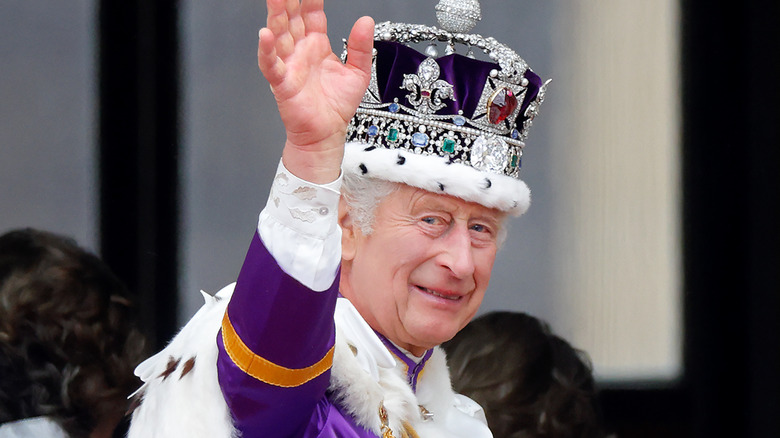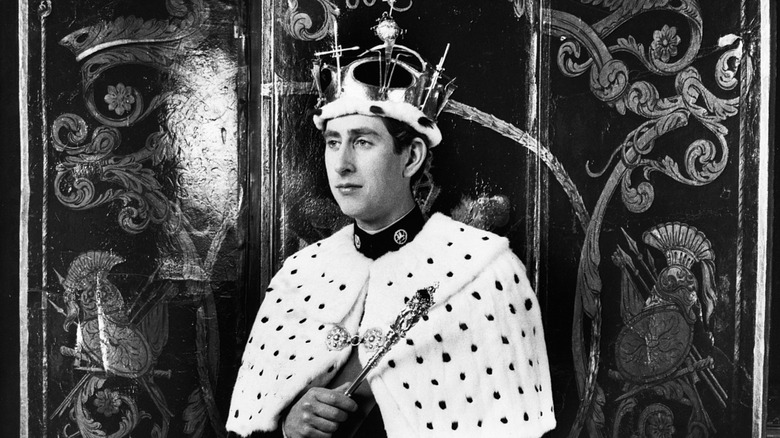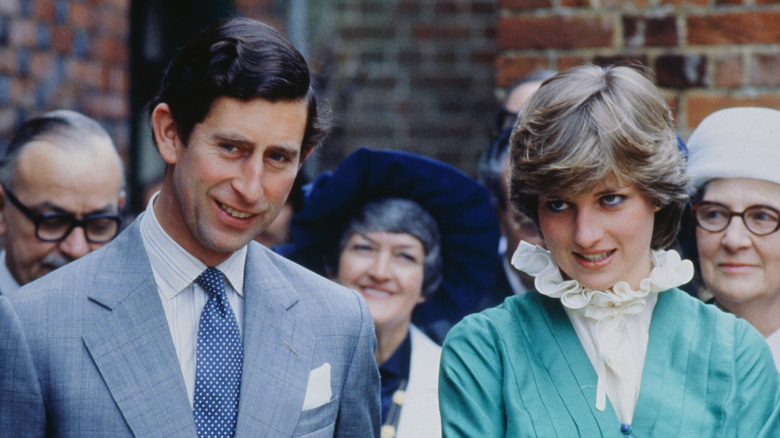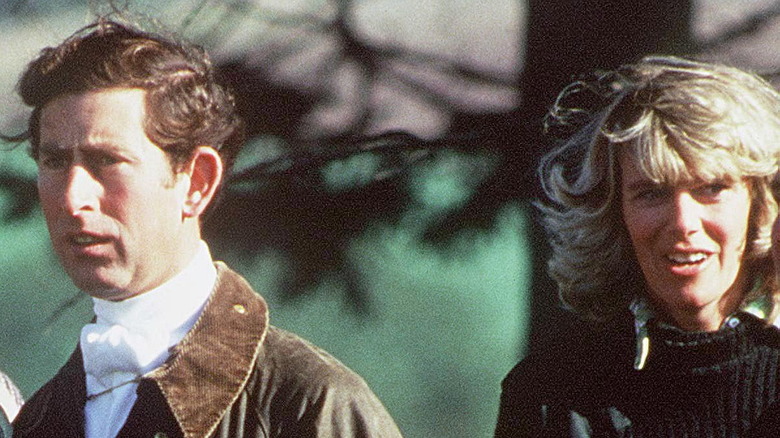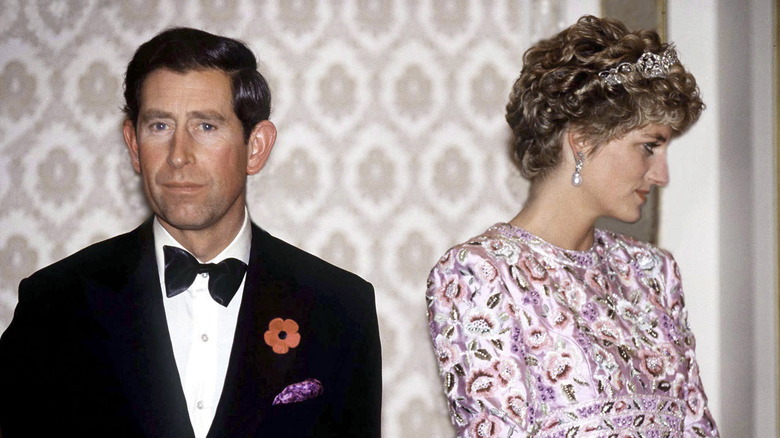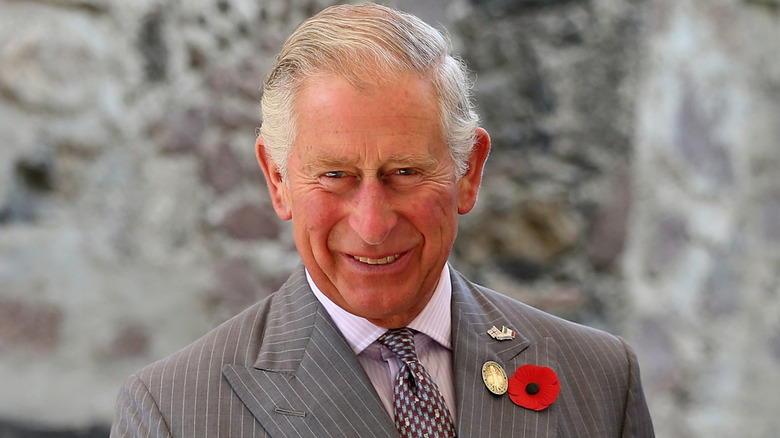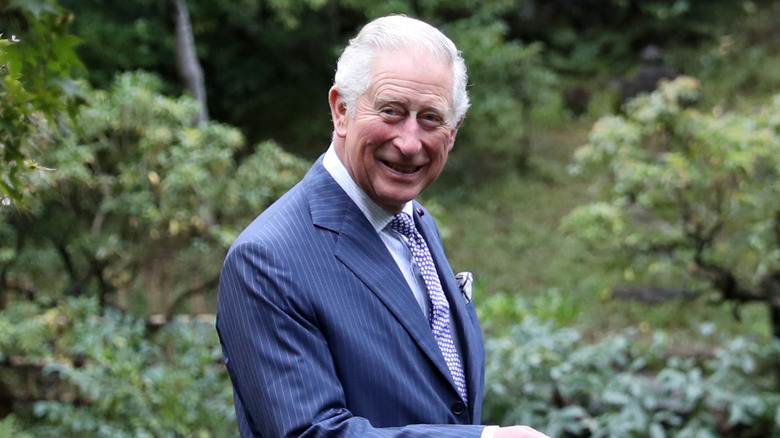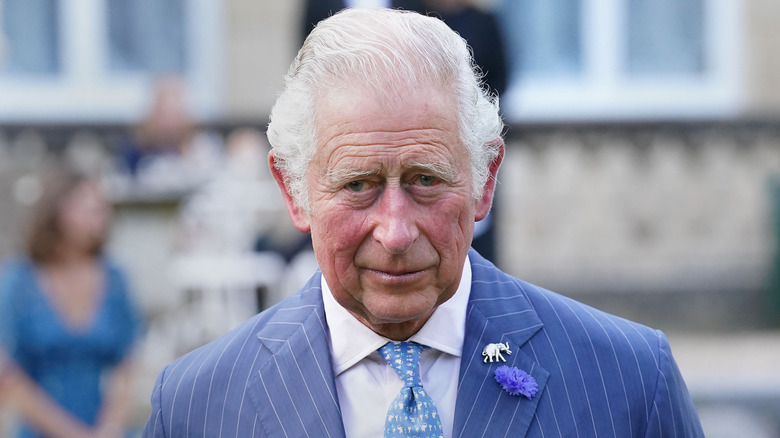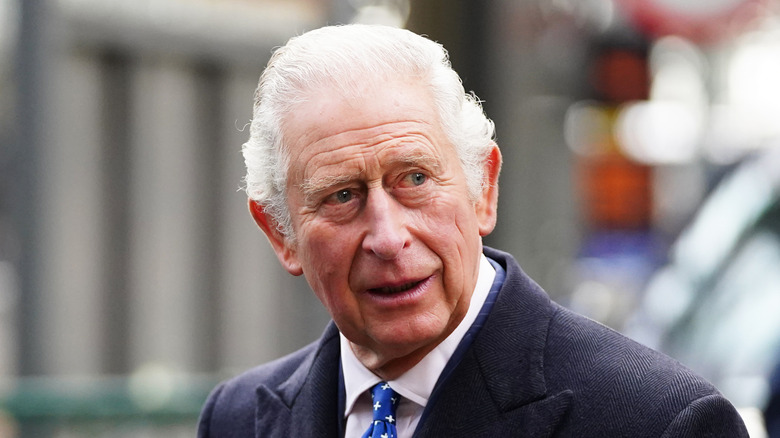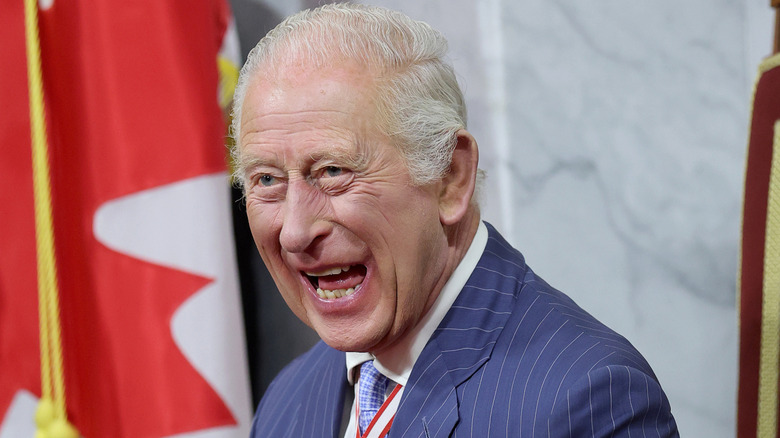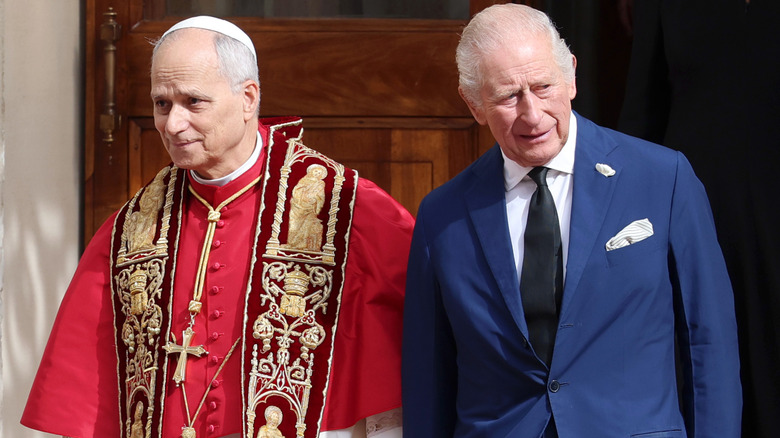The Moments That Changed Public Opinion About King Charles
We may receive a commission on purchases made from links.
Born in 1948, the first child of Queen Elizabeth II has spent his life preparing for the day when he would finally take her place as monarch. That day proved to be a long time coming; when his mother shuffled off this mortal coil in 2023 at age 96, the tragic death of the queen finally placed him on the throne — at the ripe old age of 73.
Since then, King Charles III has embraced the role he'd waited seven decades to fulfil, head of state of the United Kingdom and a whole whack of Commonwealth countries, including Canada, Australia, New Zealand, and a few Caribbean nations. As such, he's stepped out from his late mother's considerable shadow in order to put his own stamp on the British monarchy.
His success at doing so remains an open question — as will how it ends up impacting the public's opinion of him, both in the U.K. and worldwide. That opinion, of course, has swayed considerably over the years, a pendulum swinging from one extreme to another due to scandals, public statements, his failed marriage to a woman who was infinitely more beloved than he, and even the fragility of his own health.
His investiture speech helped mend fences between Britain and Wales
During the late 1960s, tensions were high between Wales and Britain. Then-Prince Charles felt that personally, when, as a 20-year-old, he spent nine weeks studying at Wales' Aberystwyth College. The purpose of his single term at the college was to learn the Welsh language, or at least enough to get through a speech at his upcoming investiture ceremony, in which his mother would crown him and bestow upon him the title of Prince of Wales. As Charles recalled in a 2019 documentary, Wales at that time was gripped by nationalist, anti-England sentiment, eager to get out from under the thumb of the Crown. "Every day I had to go down to the town where I went to these lectures, and most days there seemed to be a demonstration going on against me," he said, as reported by The Telegraph.
While he'd already held the Prince of Wales title for more than a decade, the ceremony made it official, taking place on July 1, 1969, at Caernarfon Castle. He delivered his speech in both Welsh and English, as an attempt to forge a connection with the citizens of Wales.
Was Charles' speech viewed in Wales as a cynical stunt or as heartfelt and respectful? Ultimately, speaking Welsh did indeed win over some of his critics, whose opinions of him certainly improved. On the other hand, neither did he fully quell anti-England sentiment throughout Wales, which continues to this day.
His callous remarks about fiancée Diana left everyone cold
Then-Prince Charles was 32 years old when he became engaged to Lady Diana Spencer, then just 19. While Charles had developed a reputation as a stuffy and awkward oddball, the public was immediately drawn to the fetching young future princess, whose shy demeanor and demureness struck a chord.
While the sad truth about Prince Charles and Princess Diana's marriage has long since been revealed, an early sign of the future friction to come emerged when the supposed lovebirds appeared together at a televised press conference (via The Royal Family Channel), to announce their recent engagement. It all went horribly wrong for Charles when he badly fumbled a softball question asking if they were in love. "Of course!" Diana blurted out, while her grinning fiancé clumsily responded, "Whatever 'in love' means." According to royal expert Sally Bedell Smith, not only did his remarks reinforce the already-negative opinion many held of him, but they also made him appear unsympathetic. "It was a totally inappropriate thing for him to say, but understandable given the way his mind worked and the kind of things he had said in prior years," she told People.
Diana herself commented on Charles' dismissive words in the 1992 biography, "Diana: Her True Story–in Her Own Words," admitting his statement caught her off guard. "I thought, what a strange answer. It traumatized me," she told biographer Andrew Morton, as excerpted by Women's Wear Daily.
A leaked conversation with Camilla Parker Bowles made him a laughingstock
As is the case with any high-profile split, the separation of Prince Charles and Princess Diana sparked rumors of infidelity. That spark, however, turned into a raging wildfire in 1993, when British tabloid the Mirror published the transcript of a leaked telephone conversation between Charles and Camilla Parker Bowles, reputedly recorded back in 1989.
Not only did the conversation suggest a shocking level of sexual intimacy between the two — both of whom were married to others at the time — but it also veered into some bizarre territory when Charles shared his longing wish to spend the rest of his life living in her trousers. When she joked that he'd be reincarnated as a "pair of knickers," he went one better by declaring, "Or, God forbid a Tampax." He continued by quipping, "My luck to be chucked down the lavatory and go on and on forever swirling round on the top, never going down."
The tabloids had a field day, as did "Saturday Night Live," which mercilessly spoofed the new scandal that the media had hilariously dubbed Tampongate. That conversation certainly confirmed that the deterioration of Charles' marriage was because he'd been cheating on Diana with Parker Bowles, and played a huge part in the real reason Prince Charles and Princess Diana separated.
The public turned on him after his public confession of infidelity
Charles' marriage to Diana crashed and burned, with the couple officially announcing their supposedly amicable separation in late 1992. During the course of their marriage, the British public, in addition to pretty much the rest of the planet, had fallen deeply in love with Diana. Charles' popularity, on the other hand, was not nearly so high — an imbalance that reportedly left him jealous and infuriated. In an attempt to soften the public's attitude toward him, Buckingham Palace organized a TV documentary, with British journalist Jonathan Dimbleby given unprecedented access to Charles over the course of more than a year, which included Charles sitting down for an exclusive interview.
That plan to burnish Charles' battered reputation, however, was completely flushed down the loo when Dimbleby asked Charles during the interview whether he'd been "faithful and honorable" during his marriage. "Yes, absolutely," Charles insisted. Dimbleby pushed a bit further. "And you were?" he asked. "Yes," Charles responded, but then added, following a brief pause, "Until it became irretrievably broken down, us both having tried."
Suffice it to say, admitting to cheating on the world's most beloved woman did not go over well, and the documentary had the exact opposite effect on public perception than palace officials had hoped. Not surprisingly, his admission created a feeding frenzy with the British tabloids. "In one stroke he's wiped out all the good will he's built up over 12 months," royal biographer Brian Hoey told The New York Times.
Diana's scorched-earth TV interview about their marital problems made the public feel Charles was the villain
With Prince Charles' train-wreck interview with Jonathan Dimbleby becoming a full-on disaster for Buckingham Palace, Charles' already-low public opinion took a further beating when his estranged wife (their divorce didn't become official until 1996) gave a TV interview of her own that aired in 1995. In that now-infamous interview, for BBC's "Panorama," Diana pulls no punches, admitting that she'd become depressed, which led her royal in-laws to label her "unstable" and "mentally unbalanced" and reveal she was suffering from bulimia, and attempted to harm herself.
However, what really hit Charles hard was when she explicitly called out Camilla Parker Bowles as being the other woman who was at the center of her marital problems. When asked during her interview whether Parker Bowles had been a "factor" in her breakup with Charles, she pulled no punches. "Well, there were three of us in this marriage," Diana coldly stated before wryly smiling, "so it was a bit crowded."
Diana was almost entirely engulfed with public sympathy, while Charles was villainized. "This was extraordinarily historic," said Beatrix Campbell, author of "Diana, Princess of Wales: How Sexual Politics Shook the Monarchy," told the Seattle Times. "How many times has a future heir been called to account for his behavior in front of millions of people? Like, never."
He faced public scorn after being caught red-handed attempting to influence the British government
After Princess Diana's tragic death in a Paris car wreck in 1997, tragic details about her final days became known. Meanwhile, Charles' life changed forever after Diana's death, kicking off a period in which he became so distasteful to the public that conspiracy theories emerged claiming that he'd had his ex-wife knocked off.
In the decades that passed, the scorn and hatred aimed at Charles slowly died down as Diana's memory faded. However, new scrutiny of Charles erupted in 2014 when news emerged that he'd been attempting to exert his influence on David Blunkett, who at the time was the British minister of education. When that report was investigated further, The Guardian reported that Charles' "meddling" was not a one-time thing, but a pattern of behavior spanning years, a huge no-no for royals, who are constrained by convention from getting involved in U.K. politics.
This was followed by the revelation of confidential memos in which Charles made specific policy demands of British politicians, including then-Prime Minister Tony Blair. Those documents were dubbed "the black spider memos," so named for Charles' spiderweb-like handwriting, and seriously eroded the British public's trust in Charles.
His endorsement of homeopathic medicine was criticized by the scientific community
Among Prince Charles' lobbying efforts to appear in the infamous "black spider memos" were letters entreating Britain's National Health Service to fund homeopathic medicine. While Charles has long held a fascination for homeopathy, a form of alternative medicine built upon the belief that the body can heal itself by ingesting minute amounts of natural substances, actual medical doctors and scientists insist there's been no evidence to suggest homeopathy actually works. In fact, Charles had been criticized for his support of homeopathy as far back as 1982, when a speech he gave about it earned pushback from the scientific community.
In 2019, Charles was hit with further backlash when he became patron of Britain's Faculty of Homeopathy. "This news is sadly no surprise, given how routinely Prince Charles has used his royal platform to advocate for an anti-science position," read a statement from the science-promoting Good Thinking Society.
In 2022, shortly after becoming King Charles, he appointed pro-homeopathy physician Dr. Michael Dixon as head of the royal medical household. That earned him a scolding from Edzard Ernst, an academic known for consistently debunking the claims of homeopathy. "Anyone who promotes homeopathy is undermining evidence-based medicine and rational thinking," he said in a statement to The Guardian. "We and others have shown that homeopathy is not an effective therapy, which has today become the accepted consensus."
Charles made headlines for accepting £1 million from the family of Osama bin Laden
In July 2022, less than two months before he was to become king, then-Prince Charles made headlines when The Sunday Times reported that, back in 2013, he'd accepted a donation of £1 million for his charity, the Prince of Wales's Charitable Fund, from half-brothers of notorious terrorist Osama bin Laden. However, reps at Clarence House downplayed the donation, telling the Times that "thorough due diligence" assured the charity's trustees the money was in no way connected to terrorist activities (the bin Ladens, among the wealthiest families in the Middle East, disowned Osama in 1994). The charity's chairman, Sir Ian Cheshire, told the Times that any suggestion of impropriety was "misleading and inaccurate."
Legal or not, the future king's name appearing in the same headline as the terrorist behind the 9/11 attacks didn't exactly improve public opinion about Charles. Also unhelpful were earlier reports that a close friend of the prince had promised a knighthood to a wealthy Saudi citizen who had made large donations to the charity, and that Charles had received a suitcase containing a million euros from the former prime minister of Qatar.
Regardless of the circumstances, the optics of the future king of England grabbing a suitcase full of cash didn't exactly scream "trustworthy." To some, reports of shady deals such as these only served to further erode public confidence in Charles.
A 2022 poll demonstrated just how deeply unpopular he'd become
In April 2022, while Queen Elizabeth was dealing with professional and personal turmoil in the months leading to her death that September, the results of a poll about the royal family were released. That Ipsos survey, based on a representative sampling of more than 2,000 Brits, found that 42% of British citizens believed that when the time came, Charles should step aside so that his son, Prince William, could become king instead. Only 24% of respondents felt that Charles should take his place on the throne.
Meanwhile, less than half of those surveyed (just 48%) believed that Charles would make a good king. In addition, 19% believed he'd be terrible at it, with 27% feeling ambivalent. There was a silver lining in that Charles' popularity had increased, with 43% of respondents viewing him favorably — an increase of 11 percentage points over results of a similar survey undertaken in 2018. Despite that rise, Charles' popularity paled considerably when compared to that of other British royals. His mother was viewed favorably by 69%, with Prince William coming in at 64% and Princess Catherine at 60%.
Interestingly, a British YouGov poll from 2025 indicated that Charles' popularity had increased since 2022, albeit only slightly, rising to 54%. That still placed him well behind Princess Catherine (68%), Prince William (62%), and Princess Anne (59%).
Charles' cancer diagnosis garnered sympathy from the public
Less than a year after the pomp and ritual of King Charles' coronation, in February 2024, Buckingham Palace revealed that routine medical treatment for an enlarged prostate resulted in a diagnosis of cancer. While no details were offered about either the type of cancer or its stage, Charles stepped back from public duties in order to undergo treatment.
That diagnosis led to an outpouring of support for Charles, increasingly viewed as a sympathetic figure as he faced his own mortality. He responded with a message of thanks. "As all those who have been affected by cancer will know, such kind thoughts are the greatest comfort and encouragement," he wrote, as reported by BBC News.
While Charles has largely kept details of his health private, he opened up a bit in some remarks he wrote for a booklet given to guests at a 2025 reception celebrating organizations involved in cancer research. "Each diagnosis, each new case, will be a daunting and at times frightening experience for those individuals and their loved ones," he wrote, as reported by CBS News, observing how "the darkest moments of illness can be illuminated by the greatest compassion."
His popularity soared in Canada after Trump's taunts about the 51st state
The historically close relationship between the U.S. and Canada changed radically after Donald Trump was elected president for a second time. In addition to launching a tariff-fueled trade war, Trump enraged Canadians by referring to Prime Minister Justin Trudeau as "governor" and to the country itself as America's 51st state.
As the Commonwealth nation's head of state, in May 2025, Charles arrived in Ottawa to deliver the throne speech, opening the new session of parliament. Charles had not been enjoying much popularity with Canadians in recent years; a poll conducted shortly before his coronation found that Canada was nearly last among the 15 Commonwealth nations when it came to maintaining the British monarch as head of state, with just 23% willing to vote for retaining that situation if a referendum were held.
However, subsequent polling found Charles' popularity with Canadians had soared amid the threats and taunts from the U.S. A poll conducted by Pollara Strategic Insights in May 2025 found the number of people with a positive perception of Charles had risen to 44%, a 7% increase over a previous poll. Meanwhile, those with a negative view had dropped by 10%. "Canadians are feeling better about the Crown," Pollara's Dan Arnold told CBC News, pointing out that while Charles remained less popular than his mother, "we see a clear increase in terms of the people who feel good about him and a sharp decline in his negatives."
He was both praised and vilified after breaking a 500-year religious feud by praying with the pope
Prince Charles made history in October 2025 when he traveled to the Vatican and prayed with newly installed Pope Leo XIV in the Sistine Chapel. That act of religious unity marked the first time in 500 years that Britain's monarch, who is also, by birthright, head of the Church of England, prayed with the leader of the Catholic Church. This simple act mended a rift stretching back to the Reformation, when King Henry VIII split with the Catholic Church in retaliation for the pope's refusal to grant him a divorce, instead founding his own church.
The message sent was one of reconciliation and was positively received by both Catholics and Anglicans. "It was a very beautiful gesture of being together," said theologian Hendro Munsterman in an interview with France 24.
However, not everyone was impressed by the public show of unity between the two religions. Kyle Paisley, a protestant religious leader in Northern Ireland, accused Charles of breaking his oath to uphold the protestant faith. Interviewed by BBC Radio Ulster's "Talkback," Paisley was asked if he felt that Charles should abdicate his role as head of the Church of England. "Yes, because I don't think he is being true to his oath," he said, as reported by BBC News.

